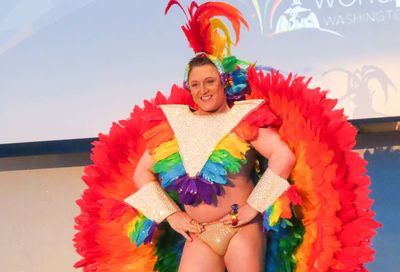DC Theater Review: Blue Camp
Rainbow Theatre Project's production of "Blue Camp" doesn't deliver the play's compelling premise

Theatergoers headed into Rainbow Theatre Project’s queer-themed, 1964-set military drama Blue Camp (★★☆☆☆) are forewarned to grab a seat near the front or the aisle, or else risk losing sight of the action from time to time. Such are the limitations of the tightly spaced seating and floor-level presentation at this world-premiere production, an episodic account of several soldiers stewing in close quarters as they await orders for dishonorable discharge.
In Tim Caggiano and Jack Calvin Hanna’s play, the eight young soldiers in question — variously branded “delinquents, queers, and deviants” by the U.S. Army — are confined to two adjoining cells in the stockade, the groups split between four accused criminals, and four accused homosexuals. Separated by the cell bars, the clashing contingents tease and harass each other good-naturedly, and sometimes not so good-naturedly, until they’re relocated to a barracks on base, where the banter and bonding continue.
The respective fates of these undesirables will rest on their testimony and the evidence in their cases, and on how desperately U.S. forces might require live bodies to launch a full-scale war against North Vietnam. Any of these eight men might be “reclaimed,” rather than discharged. Apparently, the Army can swiftly reconsider whom it deems undesirable, based on principle, prejudice, or just the practical needs of the moment. So it was in 1964, and continues to be in 2019, as the current administration fights to exclude transgender Americans who want to serve their country.
That topical connection would seem to provide a compelling subtext for Blue Camp, but the thread gets lost in director Christopher Janson’s underbaked staging. Proceeding in a loose succession of confrontations and confessions, the production rarely captures the weight of the stakes involved, where not only dishonor but death might await these servicemen. Tension doesn’t build, so much as sputter along from one man’s backstory and breakdown to the next. Subplots, much like the characters, stomp in and out, but going where?

Really, where are these guys going? There’s a preponderance of soldiers angrily storming offstage, among other emotional entrances and exits that don’t always seem consistent with the men’s circumstances of confinement. Janson and set designer Simone Schneeberg don’t appear to have resolved how to arrange the soldiers’ story within the minimal scenery of corrugated metal walls and fabric backdrop. Fabric straps hung vertically from a clothesline are pulleyed into place, inadequately playing the role of jail bars that mark the separation between cells in the stockade. But lighting designer Elliott Shugoll more clearly denotes setting and mood with spots and pools of light.
The cast varies wildly in their attempts at denoting setting and mood. In the play’s showiest role, the flamboyantly confident, cross-dressing Private Billy from Mobile, Moses Bossenbroek exudes the right brass and sass in the character’s lighter moments. As the drama evolves, however, Bossenbroek’s performance doesn’t take Billy noticeably far from point A to point B, with the character registering little awareness that these proceedings are more than just fun and games. Billy becomes a quip machine, a black Blanche-flavored belle (DuBois or Devereaux, take your pick) swanning through the barracks.
A pot-stirrer and a target, Billy has it out with practically everybody, but most strongly connects with the officer keeping watch over him and the others, Sergeant Swanger, played with effective subtlety by Jared H. Graham. In his performance, Graham conveys a committed Army man whose prejudices might believably be changed by getting to know these men. The story advances surely in his appearances onstage. Likewise, Lansing O’Leary, as possibly bi-curious or possibly closeted gay Private Gary Peterson, creates a sensitive portrayal through measured restraint. Peterson confesses to engaging in homosexual activity, but won’t “kiss and tell,” and isn’t convinced that he’s gay. He reveals himself to his comrades, yet retains an air of mystery that deepens the plot.
They should all be as intriguing as Peterson. But at least half of these characters either are overcompensating, macho jerks, or are overacted to appear to be overcompensating, macho jerks. The line between unappealing character and unappealing performance can be indistinct in this production, which only indistinctly registers the potency of the play’s thought-provoking premise.
Blue Camp runs through Nov. 24 at Thurgood Marshall Gallery inside St. Augustine’s Episcopal Church, 555 Water St. SW. Tickets are $35. Call 202-462-7833, or visit www.rainbowtheatreproject.org.
Support Metro Weekly’s Journalism
These are challenging times for news organizations. And yet it’s crucial we stay active and provide vital resources and information to both our local readers and the world. So won’t you please take a moment and consider supporting Metro Weekly with a membership? For as little as $5 a month, you can help ensure Metro Weekly magazine and MetroWeekly.com remain free, viable resources as we provide the best, most diverse, culturally-resonant LGBTQ coverage in both the D.C. region and around the world. Memberships come with exclusive perks and discounts, your own personal digital delivery of each week’s magazine (and an archive), access to our Member's Lounge when it launches this fall, and exclusive members-only items like Metro Weekly Membership Mugs and Tote Bags! Check out all our membership levels here and please join us today!






















You must be logged in to post a comment.